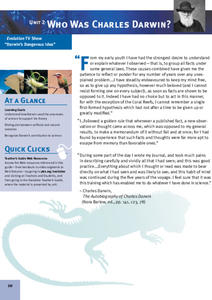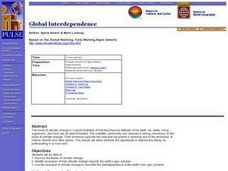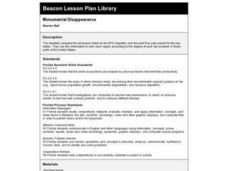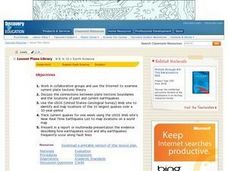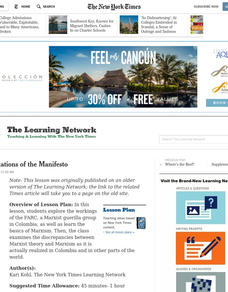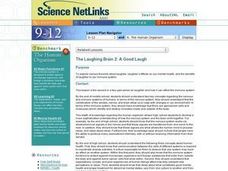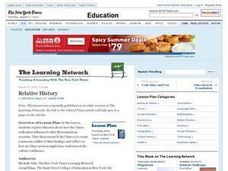Curated OER
Neanderthals
Students study Neanderthals. For this Prehistoric life lesson, students investigate two main theories regarding the relationship between Neanderthals and modern man. Students will conduct research through several provided web sites and...
Curated OER
Rocket Science
Students conduct an experiment. In this physical science lesson, students learn about Isaac Newton's theory that for every action there is an equal but opposite reaction. Students show this theory by looking at how a rocket is propelled...
Curated OER
You Decide: Roanoke the Lost Colony
Students develop an idea about what happened at the Lost Colony of Roanoke. In this Roanoke Colony activity, students examine associated vocabulary before listening to Roanoke The Lost Colony, An Unsolved Mystery from History by Jane...
Curated OER
The Disappearing Fish
Students examine the theories behind the drastic decline of the wild salmon population and the ecological ramifications of this decline.
Curated OER
Jet Engine Technology
Students discover the technology of jet engines through an interactive program. They explore the history of the gas-turbine theory and follow tutorials in how to use them. They finally read about the new Air-Breathing engines.
Curated OER
Who Was Charles Darwin?
Students examine how Darwin used the processes of science to support his theory. They distinguish between artificial and natural selection, recognize Darwin's contribution to science. They produce a newspaper describing the times in...
Curated OER
Tangled Text
Students list different forms of communication, assess importance of writing, read and discuss article "String, and Knot, Theory of Inca Writing", research system of writing, and create "How It Works" posters.
Curated OER
Properties of Matter
Students describe four states of matter and their characteristics, explain thermal expansion of matter, interpret state changes in terms of kinetic theory of matter, explain relationship between temperature and volume of a gas, state...
Curated OER
Get Ready to Rumble
Students use the Internet to examine earthquakes. They discover the theory of tectonic plates and analyze faults throughout the world. They also examine the science of seismology to explain how earthquakes are measured.
Curated OER
World Geography: Global Interdependence
Students are able to discuss the theory of climate change. They identify examples of how climate change impacts the earth's geo-spheres. Students are able to use the example of climate change to describe the interdependence of the...
Curated OER
Elements of Chemistry: Atoms: The Building Blocks of Matter
Students explore scientific theories and the works of scientists. In this chemistry lesson students develop a timeline that shows how scientists work was built on the ones before them.
Curated OER
Robert Boyle and the Mechanical Philosophy
Students read and discuss Boyle's Mechanical Philosophy and his rejection of Aristotle's theory of "Forms and Qualities." They answer a given set of questions and discuss these with the class.
Curated OER
Talking About a Resolution
Learners explore Nobel Prize winning economist Thomas C. Schelling's strategic egonomics theory as it applies to making new year's resolutions. They make their own resolutions and develop plans to keep them using Schelling's strategies.
Curated OER
Monumental Disappearance
Fourth graders compare the emissions listed on the EPA isopleths over the past five-year period for ten key states. They use this information to rank each region according to the degree of acid rain problem in those parts of the United...
Curated OER
Science as a Source of Social Controversy
Students research the two opposing views and biographical information about Ptolemy and Copernicus in order to be familiar with the societal viewpoints that influenced the thinking of these two scientists. Students role-play supporters...
Curated OER
Earthquakes And Fault Lines
Young scholars discuss major causes of earthquakes and identify famous fault lines, access and map information about ten largest earthquakes in world from 1989 to 1998, and theorize about location of these earthquakes as they relate to...
Curated OER
Manifestations of the Manifesto
Young scholars explore the workings of FARC, a Marxist guerilla group in Colombia, as well as study the basics of Marxism. They examine the discrepancies between Marxist theory and Marxism as it is actually realized in Colombia and other...
Curated OER
We, the First People
Students explore new support regarding the earliest peopling of America by examining multiple theories on the migration of the first people to America, investigating related archaeological finds, and creating research-based scientific...
Curated OER
THE LAUGHING BRAIN 2: A GOOD LAUGH
Students explore various theories about laughter, laughter's effects on our mental health, and the benefits of laughter to our immune system.
Curated OER
The Woman Who Slept for Thirty Years
Students are given a bit of information, but must share their information with other students in order to learn enough to solve the puzzle. When students have all the clues, they construct a theory to explain the facts. The teacher adds...
Curated OER
Introduction to Gases
Students are introduced to gases. In this science lesson plan, students demonstrate that gases are a state of matter, generate a number of gases, discover some properties of gases, compare some of the properties of different gases, and...
Curated OER
Lifestyles of the Extreme and Adapted
Students explain challenging theories about the evolution and distribution of microbes. They also investigate other examples of extremophile species, then create posters and write diary entries about them.
Curated OER
Relative History
Students explore theories about how the Olmec civilization influenced other Mesoamerican societies. They research the Olmecs to create a museum exhibit of their findings and reflect on how an Olmec person might have understood the...
Curated OER
Pandemics and Epidemics
Young scholars evaluate data related to population growth, along with problems and soultions: disease cvontrol. They are able to explain how changes in habitat may affect organisms. Students evaluate evolutionary theories and processes.







